The scaffolding is up and the old Weston Bakery Building at 666 Elgin, at Sherbrook, is ready to come down to make way for a new Women's Hospital, (also). When Weston made a land trade with the province in 2009 that saw it head for the suburbs it ended over a century of bread baking on that corner. Here is a look back !
In 1900 things were not well in Winnipeg's baking circles.
There was labour unrest at the bakeries and problems within the union ranks between master bakers and bakery workers.
Allegations of price fixing, price gouging and short-weighting of measurements were leveled at some city bakeries. This caused the city to step in to regulate the size and price of this most basic commodity. A basic white loaf was to be 32 ounces and sold for 6.25 cents each. After that initial price was set it was up to bakeries to self-regulate the price. In 1905, for instance, they voted to raise it to 7 cents per loaf due to higher flour prices.
 In 1902 a group formed within the Winnipeg Cooperative Society to build a bakery that would offer quality, low-cost baked goods and fair, union wages to employees. The Society, whose offices would be housed at the bakery, later branched out into other consumer products such as fuel.
In 1902 a group formed within the Winnipeg Cooperative Society to build a bakery that would offer quality, low-cost baked goods and fair, union wages to employees. The Society, whose offices would be housed at the bakery, later branched out into other consumer products such as fuel.The location they chose was a few feet from Elgin and Nena (now Sherbrook) and on November 25th at 8 pm a grand opening was held. Within a couple of years additional ovens were added and 15 varieties of bread were being delivered across the city.
The Voice, May 1, 1903
 In 1910 the Cooperative Bakery merged with the Crane and Davis Bakery at 765 Dufferin. A few years later it moved to the site of the Maple Leaf bakery at 277 Dufferin and in 1923 went into receivership.
In 1910 the Cooperative Bakery merged with the Crane and Davis Bakery at 765 Dufferin. A few years later it moved to the site of the Maple Leaf bakery at 277 Dufferin and in 1923 went into receivership. The Elgin Street site was bought by the duo of J.T. Spiers and Edward Parnell. Both men already had bakeries of their own but decided to join forces to create the Spiers Parnell Bakery Company.
The Elgin Street site was bought by the duo of J.T. Spiers and Edward Parnell. Both men already had bakeries of their own but decided to join forces to create the Spiers Parnell Bakery Company. 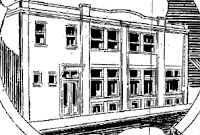 |
Speirs Parnell Bakery on Elgin ca. 1911 |
 The Speirs - Parnell partnership may have been spurred on by a baker in Toronto by the name of George Weston of Weston Bakery founded in 1882 .
The Speirs - Parnell partnership may have been spurred on by a baker in Toronto by the name of George Weston of Weston Bakery founded in 1882 .In 1911 Weston created Canada Bread and went on an amalgamation spree, snapping up bakeries in places like Montreal and Winnipeg. The local bakeries were allowed to retain their separate identity and their product line as long as they did not compete with the basic loaf product offered by the parent company. Speirs - Parnell became part of that Weston network.
In 1923 the bakery underwent a multi-storey addition on its west side. The new plant was able to bake 120,000 loaves per year, employed 200 people and had a delivery fleet of 90 trucks.
The Speirs Parnell name remained a fixture in Winnipeg until 1943 when it was rechristened Weston Bread and Cake Limited.

In 1953 a fire destroyed the baking area on the east side of the complex. The company increased production at other local plants to make up for the loss until they could rebuild.












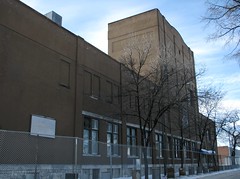



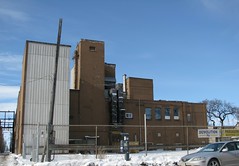
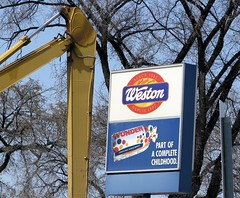
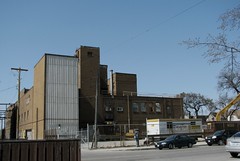
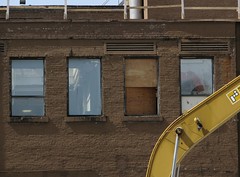
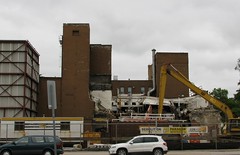
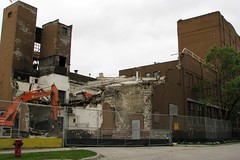
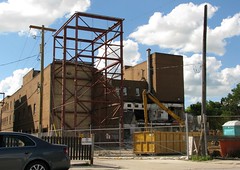
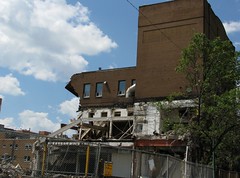
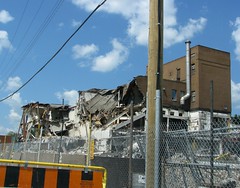
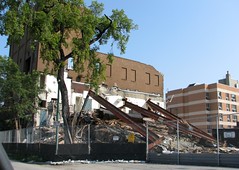
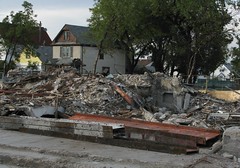
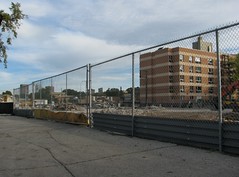
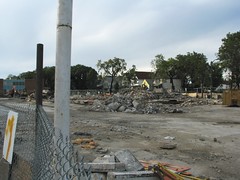
7 comments:
My Grandfather worked for Spears Parnell and Canada Bread from 1903 - 1938. I have a silver tray commemorating those 25 years. He immigrated from England in 1912.
IT would have been quite the industry back then. There seemed to be at least one major bakery and creamery in every neighbourhood !
Some 40 years ago, I was given a Speirs Parnell Bread Box from the Thorsteinson Brother's Store in HusavicK,Manitoba, 4 miles south of Gimli. This actually is a big crate with the name Speirs Parnell Bread on it's side. This was the type of crate that was formerly used to ship bread to country stores on the train. The crate sat inside the store to the left of the front door. Many people sat on it as it was also close to the cash register. There are some initials carved on that crate as well. My son now has it in his living room, in one corner, and uses it as a table.
My grandfather also worked for Speirs Parnell/Weston’s Bakery although I don’t know the exact years. He came to Canada from Scotland in 1922. He started out delivering bread on a horse and wagon down Henderson Highway route and ended up supervising the fleet of trucks by retirement. His name was John (Jock) Fyfe 😊
My father worked for Weston's when he arrived in Canada from England in 1954 and retired from there in 1984. He worked for Cookson's bakery in Lytham St Anne's, Lancashire which was owned by Weston. I also worked at Weston's during the summer holidays. What I remember about that time is that the work week was 35 hours and we went on strike in 1970 for more money and a shorter work week. Lol! We never had it so good.
My first Home in Winnipeg 1980 was across the street. I would get treats from there discounted baked goods. The metal doors to the right of the office use to be where it was. I remember how good it smelled in the morning before going to school. I would walk across and sometimes the delivery guys would throw me a fresh bag of Weston bread I would have some for breakfast walking to school Good memories 😊
I too worked at Weston’s off and on until the strike in 1970. Yes, we were very well paid and with a very short work week for the time. Turned down a great offer from the company and went on strike. When it was over the dept. I worked in at the time, the Cake Shop, was eliminated and so were many jobs. Mine included. I believe when it was finally settled we accepted either the initial offer or maybe even less. I enjoyed the time I worked there. Met many interesting folks. Harry Novak was the plant superintendent (I think that was his position). Something similar happened in Vancouver in about 1990 when the staff went on strike and in the end the entire plant was shut down and everyone was without a job. The plant in Vancouver was located on the southwest corner of Boundary and Lougheed. I think it’s a car dealership today.
Post a Comment